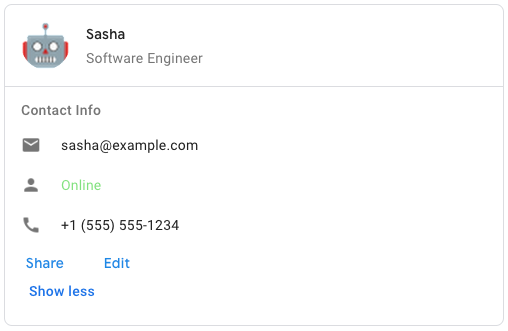pub struct Card {
pub header: Option<CardHeader>,
pub sections: Vec<Section>,
pub section_divider_style: i32,
pub card_actions: Vec<CardAction>,
pub name: String,
pub fixed_footer: Option<Box<CardFixedFooter>>,
pub display_style: i32,
pub peek_card_header: Option<CardHeader>,
}Expand description
A card interface displayed in a Google Chat message or Google Workspace Add-on.
Cards support a defined layout, interactive UI elements like buttons, and rich media like images. Use cards to present detailed information, gather information from users, and guide users to take a next step.
To learn how to build cards, see the following documentation:
- For Google Chat apps, see Design the components of a card or dialog.
- For Google Workspace Add-ons, see Card-based interfaces.
Example: Card message for a Google Chat app

To create the sample card message in Google Chat, use the following JSON:
{
"cardsV2": [
{
"cardId": "unique-card-id",
"card": {
"header": {
"title": "Sasha",
"subtitle": "Software Engineer",
"imageUrl":
"<https://developers.google.com/workspace/chat/images/quickstart-app-avatar.png",>
"imageType": "CIRCLE",
"imageAltText": "Avatar for Sasha"
},
"sections": [
{
"header": "Contact Info",
"collapsible": true,
"uncollapsibleWidgetsCount": 1,
"widgets": [
{
"decoratedText": {
"startIcon": {
"knownIcon": "EMAIL"
},
"text": "sasha@example.com"
}
},
{
"decoratedText": {
"startIcon": {
"knownIcon": "PERSON"
},
"text": "<font color=\"#80e27e\">Online</font>"
}
},
{
"decoratedText": {
"startIcon": {
"knownIcon": "PHONE"
},
"text": "+1 (555) 555-1234"
}
},
{
"buttonList": {
"buttons": [
{
"text": "Share",
"onClick": {
"openLink": {
"url": "<https://example.com/share">
}
}
},
{
"text": "Edit",
"onClick": {
"action": {
"function": "goToView",
"parameters": [
{
"key": "viewType",
"value": "EDIT"
}
]
}
}
}
]
}
}
]
}
]
}
}
]
}Fields§
§header: Option<CardHeader>The header of the card. A header usually contains a leading image and a title. Headers always appear at the top of a card.
sections: Vec<Section>Contains a collection of widgets. Each section has its own, optional header. Sections are visually separated by a line divider. For an example in Google Chat apps, see Define a section of a card.
section_divider_style: i32The divider style between sections.
card_actions: Vec<CardAction>The card’s actions. Actions are added to the card’s toolbar menu.
For example, the following JSON constructs a card action menu with
Settings and Send Feedback options:
"card_actions": [
{
"actionLabel": "Settings",
"onClick": {
"action": {
"functionName": "goToView",
"parameters": [
{
"key": "viewType",
"value": "SETTING"
}
],
"loadIndicator": "LoadIndicator.SPINNER"
}
}
},
{
"actionLabel": "Send Feedback",
"onClick": {
"openLink": {
"url": "<https://example.com/feedback">
}
}
}
]name: StringName of the card. Used as a card identifier in card navigation.
The fixed footer shown at the bottom of this card.
Setting fixedFooter without specifying a primaryButton or a
secondaryButton causes an error. For Chat apps, you can use fixed footers
in
dialogs, but not
card
messages.
display_style: i32In Google Workspace Add-ons, sets the display properties of the
peekCardHeader.
peek_card_header: Option<CardHeader>When displaying contextual content, the peek card header acts as a placeholder so that the user can navigate forward between the homepage cards and the contextual cards.
Implementations§
Source§impl Card
impl Card
Sourcepub fn display_style(&self) -> DisplayStyle
pub fn display_style(&self) -> DisplayStyle
Returns the enum value of display_style, or the default if the field is set to an invalid enum value.
Sourcepub fn set_display_style(&mut self, value: DisplayStyle)
pub fn set_display_style(&mut self, value: DisplayStyle)
Sets display_style to the provided enum value.
Sourcepub fn section_divider_style(&self) -> DividerStyle
pub fn section_divider_style(&self) -> DividerStyle
Returns the enum value of section_divider_style, or the default if the field is set to an invalid enum value.
Sourcepub fn set_section_divider_style(&mut self, value: DividerStyle)
pub fn set_section_divider_style(&mut self, value: DividerStyle)
Sets section_divider_style to the provided enum value.
Trait Implementations§
Source§impl Message for Card
impl Message for Card
Source§fn encoded_len(&self) -> usize
fn encoded_len(&self) -> usize
Source§fn encode(&self, buf: &mut impl BufMut) -> Result<(), EncodeError>where
Self: Sized,
fn encode(&self, buf: &mut impl BufMut) -> Result<(), EncodeError>where
Self: Sized,
Source§fn encode_to_vec(&self) -> Vec<u8>where
Self: Sized,
fn encode_to_vec(&self) -> Vec<u8>where
Self: Sized,
Source§fn encode_length_delimited(
&self,
buf: &mut impl BufMut,
) -> Result<(), EncodeError>where
Self: Sized,
fn encode_length_delimited(
&self,
buf: &mut impl BufMut,
) -> Result<(), EncodeError>where
Self: Sized,
Source§fn encode_length_delimited_to_vec(&self) -> Vec<u8>where
Self: Sized,
fn encode_length_delimited_to_vec(&self) -> Vec<u8>where
Self: Sized,
Source§fn decode(buf: impl Buf) -> Result<Self, DecodeError>where
Self: Default,
fn decode(buf: impl Buf) -> Result<Self, DecodeError>where
Self: Default,
Source§fn decode_length_delimited(buf: impl Buf) -> Result<Self, DecodeError>where
Self: Default,
fn decode_length_delimited(buf: impl Buf) -> Result<Self, DecodeError>where
Self: Default,
Source§fn merge(&mut self, buf: impl Buf) -> Result<(), DecodeError>where
Self: Sized,
fn merge(&mut self, buf: impl Buf) -> Result<(), DecodeError>where
Self: Sized,
self. Read moreSource§fn merge_length_delimited(&mut self, buf: impl Buf) -> Result<(), DecodeError>where
Self: Sized,
fn merge_length_delimited(&mut self, buf: impl Buf) -> Result<(), DecodeError>where
Self: Sized,
self.impl StructuralPartialEq for Card
Auto Trait Implementations§
impl Freeze for Card
impl RefUnwindSafe for Card
impl Send for Card
impl Sync for Card
impl Unpin for Card
impl UnwindSafe for Card
Blanket Implementations§
Source§impl<T> BorrowMut<T> for Twhere
T: ?Sized,
impl<T> BorrowMut<T> for Twhere
T: ?Sized,
Source§fn borrow_mut(&mut self) -> &mut T
fn borrow_mut(&mut self) -> &mut T
Source§impl<T> CloneToUninit for Twhere
T: Clone,
impl<T> CloneToUninit for Twhere
T: Clone,
Source§impl<T> Instrument for T
impl<T> Instrument for T
Source§fn instrument(self, span: Span) -> Instrumented<Self>
fn instrument(self, span: Span) -> Instrumented<Self>
Source§fn in_current_span(self) -> Instrumented<Self>
fn in_current_span(self) -> Instrumented<Self>
Source§impl<T> IntoRequest<T> for T
impl<T> IntoRequest<T> for T
Source§fn into_request(self) -> Request<T>
fn into_request(self) -> Request<T>
T in a tonic::Request